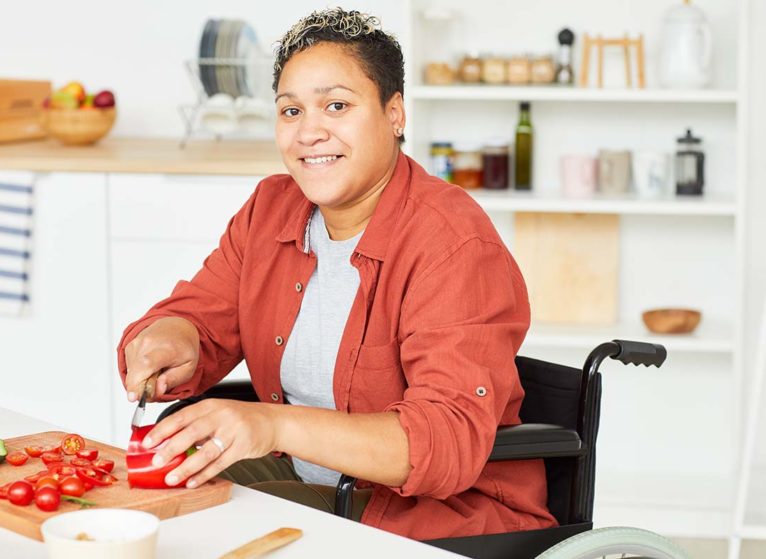For me, a good hair day is essential to my overall well-being. But amyotrophic lateral sclerosis (ALS) — a chronic illness I’ve lived with for over a decade — has taken a toll on my arms and hands, causing severe weakness and dexterity problems. And made doing my hair challenging.
The most important part of styling my hair is the finishing touch: hairspray. It gives the illusion of volume and swagger to my straight, baby-fine locks. Imagine my dismay several years ago when my fingers got too weak to press the nozzle on a hairspray can.
A friend suggested attaching an aerosol trigger handle to the hairspray can. They sell them at hardware stores to use with cans of spray paint. It helped me squeeze the trigger with my whole hand instead of one finger. This chronic illness life hack did the trick. I also felt empowered. I retained the independence to do my own hair.
Living With a Degenerative Chronic Illness
I know I’m not alone in experiencing the frustration of declining function caused by a degenerative illness. As they progress, these chronic illnesses — ALS, multiple sclerosis (MS), Alzheimer’s disease, Parkinson’s disease, Huntington’s disease, and arthritis — can lead to:
Do You or a Loved One Have a Degenerative Illness?
Find expert care and support services at UVA Health.
- Muscle weakness and atrophy (wasting away)
- Persistent fatigue
- Balance problems
- Decreased mobility
- Chronic pain
- Memory loss and confusion
- Vision loss
Over time, they affect your ability to do everyday tasks, from bathing and getting dressed to going to the bathroom, eating, and walking.
Chronic Illness Life Hacks Make Things Easier
It’s not easy to cope with losing independence. You’ll need a strong medical team, like the UVA Health ALS experts who care for me. And you’ll likely need the support of a caregiver at home.
But for many of the everyday challenges, a life hack or shortcut can make things easier. It might mean buying a new gadget. Or repurposing common household items. Get creative. Read on to learn some common chronic illness life hacks.
Hack #1: Chip Clips & String
The Problem: Your arms are too weak to pull your pants up.
When I’m home alone with no one around to help, I often walk around with sagging pants — like the skateboarders and hip-hop artists of the 1990s. Some days, my hands and arms are too weak to grasp the waistband and pull them up all the way.
The Fix: First, wear loose clothing with an elastic waistband, suggests UVA Health occupational therapist Kate Kucera.
“Those tend to be easier to pull up than something that's form-fitting with a tighter waistband or buttons and zippers,” she says.
If your muscle weakness is mostly on one side, or if you just have trouble bending over, Kucera recommends pant clip dressing aids. Attach one end to your shirt and the other to your waistband. That keeps the pants from falling all the way to the floor. You can use your stronger arm to pull up your pants.
You can also make your own using chip clips. Connect two of them with a piece of string (cut to whatever length you need). Voila! You’ve Macgyvered your first hack.
Hack #2: Help Picking Things Up
The Problem: You have trouble grasping and picking things up.
This is a daily struggle. Honestly, sometimes my husband comes home to a floor littered with tissues that missed the trashcan, a dropped pen, or a stray potato chip I couldn’t pick up. It’s a good thing I’m lovable!
With the loss of fine motor skills, you may have difficulty holding a pencil, using a fork and knife, grasping a cup, or picking up things you’ve dropped.
The Fix: One of these can help.
- A reacher. They come in many styles. So be sure to find one that you can operate. Some are made with a magnetic tip to pick up metal items.
- EazyHold straps or universal cuffs. Use these to help you hold objects such as cups, utensils, pencils, and more. I’ve found them useful for my razor.
- Coban wrap can build up handles, utensils, pencils and pens, or other small objects, making them easier to grasp. “If you have hand weakness or a tremor, the bigger the object, the easier it is to hold onto,” Kucera says. “That’s because less muscle recruitment is needed to grasp onto that object.”
- Dycem is one of my personal favorites. You can use this non-slip material under your dinner plate to keep it in place. It’s also useful for opening tight jar lids.
- Zipper pulls are great if you lack the fine motor skills needed to pinch a zipper and slide it up. You can find these in different shapes and styles. The round ones work well because you can hook your finger in them and pull.
Bonus tip: A few years ago, I began having trouble unlocking and opening our front door. It was difficult for me to grasp the key and turn the knob. So, my husband installed a keyless entry system. Now I just punch in our secret code. I can easily open the lever handle. And nobody ever gets locked out of the house because they forgot their key!
Hack #3: Make Meals Easier
The Problem: If you’re losing the ability to do the basic activities of daily living, cooking can seem like a daunting task. Your energy is already low, so you’ll need to find new ways of doing things. That includes meal prep.
The Fix: Plan a weekly menu and use that as your guide for grocery shopping. And while we’re on the subject of groceries, try your local store’s delivery or pick-up service. You'll also save time and energy for the activities you enjoy.
Here are a few other chronic illness life hacks:
- Gather all the ingredients you need and put them in one easy-to-reach location.
- Do your work sitting down. Pull up a chair and work at the kitchen table or sit on a stool to use a countertop.
- Use lightweight dishes that are easy to hold.
- Use a non-skid material to keep bowls in place.
- Inexpensive, handy gadgets can make the job easier. Use a food processor to chop veggies. Or try a right-angled knife. And this egg cracker is one of my personal favorites for baking. It makes a clean break, leaving no shells in the batter!
- Double the recipe and freeze half. That way, you’ll have meals ready for times when fatigue has you down.
- And it’s okay to fix a frozen dinner if you need to, or get a pizza delivered.
Hack #4: Make Housework Less Work
The Problem: You don't have the energy or strength for housework.
Maintaining a home can be tiring for anyone. But it’s especially draining if you’re living with a degenerative illness.
The Fix: Set realistic, daily goals.
Know your limitations. Are you trying to pack too much in a day? Maybe you’re trying to do the most physically demanding jobs at the time of day when your energy level is lowest.
“You’ve got to prioritize each day and figure out what's really important to you,” Kucera says. “It’s about looking ahead and planning. For example, if you’re going to clean the house, don’t plan to do it on a day when you’re also going grocery shopping or have a million doctor appointments. Break things up and build in time for rest breaks.”
Here are some other ways to simplify:
- Keep all the supplies you need handy. If you live in a two-story house, for example, store a set of cleaning supplies on each level. Or wear an apron with pockets to carry around the things you need most.
- Use lightweight cleaning tools. For example, a portable wet mop may be easier to use than lugging around an old-fashioned mop and bucket.
- Fold laundry sitting down.
- Enlist the help of family and friends.
Hack #5: Prevent Falls
The Problem: You're afraid of falling.
That’s understandable. If you have a degenerative illness, you likely have a higher risk of falling.
“Fall prevention is huge,” Kucera says. “If you fall, that can actually make things way worse. It can set you back, depending on what injuries you sustain.”
The Fix: Make adjustments at home to prevent falls.
Look around. These simple steps can prevent falls at home:
- Remove throw rugs or secure them with double-sided tape
- Wear sturdy, supportive shoes with nonslip soles
- Minimize clutter
- Use a seat in the shower
- Install bright lights, and use nightlights
- Install railings on all staircases
- Use mobility devices, such as a cane, walker or rollator, scooter, or wheelchair if appropriate
Different Life Hacks for Different Folks
When it comes to finding a new way of doing something, Kucera says it’s important to remember that there's no one-size-fits-all solution to any challenge. A hack that works well for one person may not work well for someone else.
If you’re having difficulty with everyday activities, it may be time to consult an occupational therapist. They can evaluate your range of motion and muscle strength, along with your environment and personal goals to help you manage everyday tasks.
“What we do in OT is constantly an individualized approach,” Kucera says. “We try to figure out what's going to suit a person's lifestyle.”



Great article, love these tips!